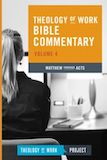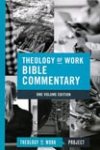Introduction to Mark

The Gospel of Mark, like the other Gospels, is about the work of Jesus. His work is to teach, to heal, to perform signs of God’s power, and most of all to die and be raised to life for the benefit of humanity. Christ’s work is absolutely unique. Yet it is also a seamless part of the work of all God’s people, which is to cooperate with God in restoring the world to the way God intended it from the beginning. Our work is not Christ’s work, but our work has the same end as his. Therefore the Gospel of Mark is not about our work, but it informs our work and defines the ultimate goal of our work.
By studying Mark, we discover God’s call to work in the service of his kingdom. We discern the rhythms of work, rest, and worship God intends for our lives. We see the opportunities and dangers inherent in earning a living, accumulating wealth, gaining status, paying taxes, and working in a society that does not necessarily aim toward God’s purposes. We meet fishermen, labourers, mothers and fathers (parenting is a type of work!), tax collectors, people with disabilities that affect their work, leaders, farmers, lawyers, priests, builders, philanthropists (mostly women), a very rich man, merchants, bankers, soldiers, and governors. We recognize the same bewildering range of personalities we encounter in life and work today. We encounter people not as isolated individuals, but as members of families, communities, and nations. Work and workers are everywhere in the Gospel of Mark.
Mark is the briefest Gospel. It contains less of Jesus’ teaching material than Matthew and Luke. Our task, then, must be to pay close attention to the details in Mark to see how his Gospel applies to non-church work. The primary work-related passages in Mark fall into three categories: 1) call narratives, as Jesus calls disciples to work on behalf of God’s kingdom; 2) Sabbath controversies concerning the rhythm of work and rest; and 3) economic issues concerning wealth and its accumulation, and taxation. We will discuss the call narratives under the heading of Kingdom and Discipleship, the Sabbath controversies under the heading of Rhythms of Work, Rest and Worship, and the episodes related to taxation and wealth under Economic Issues. In each of these categories, Mark is primarily concerned with how those who would follow Jesus must be transformed at a deep level.
As with the other Gospels, Mark is set against a background of turbulent economic times. During the Roman era, Galilee was undergoing major social upheaval, with land increasingly owned by a wealthy few — often foreigners — and with a general movement away from small-scale farming to larger-scale, estate-based agriculture. Those who had once been tenant farmers or even landowners were forced to become day labourers, often as a result of having lost their own property through the foreclosure of loans taken to pay Roman taxes.[1] Set against such a background, it is small wonder that economic and fiscal themes emerge in Mark’s narrative and in the teaching of Jesus, and an awareness of this social context allows us to appreciate undercurrents in these that we might otherwise have overlooked.
Sean Freyne, Jesus: A Jewish Galilean (London/New York: T&T Clark, 2004), 45-46.




